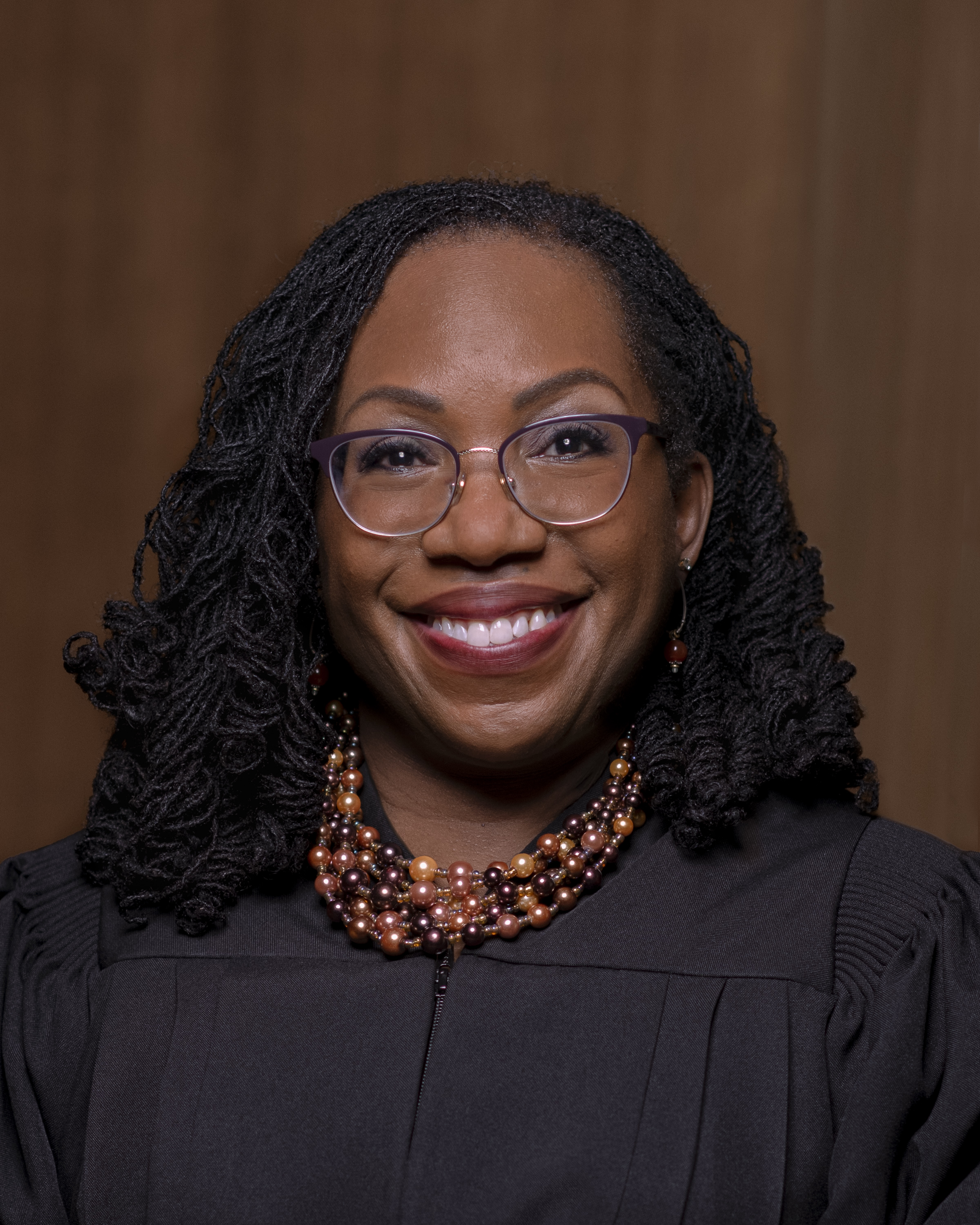
Ketanji Brown Jackson
Ketanji Onyika Brown Jackson (née Brown; /kəˈtɑːndʒi/ kə-TAHN-jee; born September 14, 1970) is an American lawyer and jurist who is an associate justice of the Supreme Court of the United States. Jackson was nominated to the Supreme Court by President Joe Biden on February 25, 2022, and confirmed by the U.S. Senate and sworn into office that same year.[1][2] She is the first black woman and the first former federal public defender to serve on the Supreme Court. From 2021 to 2022, Jackson was a United States circuit judge of the United States Court of Appeals for the District of Columbia Circuit.
Ketanji Brown Jackson
Jackson was born in Washington, D.C., and raised in Miami, Florida. She received her undergraduate and legal education at Harvard University, where she served as an editor of the Harvard Law Review, and clerked for Justice Stephen Breyer, whose seat she later assumed on the Supreme Court.[3] From 2010 to 2014, Jackson was the vice chairwoman of the United States Sentencing Commission. In 2013, President Barack Obama appointed her as a district judge for the United States District Court for the District of Columbia, where she served until 2021. Jackson served as a Harvard Board of Overseers member from 2016 to 2022.
Early life and education
Jackson was born on September 14, 1970, in Washington, D.C.,[4] to parents who were both teachers and had been educated at historically black colleges and universities.[5] Her father, Johnny Brown, graduated from the University of Miami School of Law and became chief attorney for the Miami-Dade County School Board.[6] Her mother, Ellery, was the school principal at the New World School of the Arts in Miami.[7] One of her uncles, Calvin Ross, served as the chief of the Miami Police Department.[8][9][10]
Jackson grew up in Miami and attended Miami Palmetto Senior High School.[11] She distinguished herself as a champion debater,[12] winning the national oratory title at the National Catholic Forensic League championships in New Orleans during her senior year.[13] She has recalled her experience with high school debate as one "that I can say without hesitation was the one activity that best prepared me for future success in law and in life."[14] In 1988, Jackson graduated from Palmetto as senior class president.[12][15] In her high school yearbook, she was quoted as saying that she wanted "to go into law and eventually have a judicial appointment".[16]
After high school, Jackson matriculated at Harvard University to study government, having applied despite her guidance counselor's advice to set her sights lower.[17] She took classes in drama and performed improv comedy, forming a diverse friend group.[18][19] As a member of the Black Students Association, she led protests against a student who displayed a Confederate flag from his dormitory window and protested the lack of full-time professors in the Afro-American Studies Department. While a freshman, Jackson enrolled in Michael Sandel's course Justice, which she has called a major influence during her undergraduate years.[19] She graduated from Harvard in 1992 with a Bachelor of Arts, magna cum laude.[20][12] Her senior thesis was titled "The Hand of Oppression: Plea Bargaining Processes and the Coercion of Criminal Defendants".[21]
From 1992 to 1993, Jackson worked as a staff reporter and researcher for Time magazine.[22] She then attended Harvard Law School, where she was a supervising editor of the Harvard Law Review, graduating in 1996 with a Juris Doctor, cum laude.[23][24]
Early career
After law school, Jackson served as a law clerk to Judge Patti B. Saris of the United States District Court for the District of Massachusetts from 1996 to 1997,[22] then to Judge Bruce M. Selya of the United States Court of Appeals for the First Circuit from 1997 to 1998.[25] She spent a year in private practice at the Washington, D.C., law firm of Miller Cassidy Larroca & Lewin (now part of Baker Botts), then clerked for Justice Stephen Breyer from 1999 to 2000.[11][26]
Jackson returned to private legal practice at the law firm of Goodwin Procter from 2000 to 2002, then under Kenneth Feinberg at the law firm now called Feinberg & Rozen LLP from 2002 to 2003.[27][28] From 2003 to 2005, she was an assistant special counsel to the United States Sentencing Commission.[29] From 2005 to 2007, Jackson was an assistant federal public defender in Washington, D.C., where she handled cases before the United States Court of Appeals for the District of Columbia Circuit.[30] A review by The Washington Post of cases Jackson handled during her time as a public defender showed that "she won uncommon victories against the government that shortened or erased lengthy prison terms".[31] From 2007 to 2010, Jackson was an appellate specialist in private practice at the law firm of Morrison & Foerster.[28][26]
U.S. Sentencing Commission (2010–2014)
On July 23, 2009, President Obama nominated Jackson as vice chair of the United States Sentencing Commission.[32][33] The Senate Judiciary Committee favorably reported her nomination by voice vote on November 5, 2009. The Senate confirmed her nomination by voice vote on February 11, 2010.[34] She succeeded Michael E. Horowitz, who had served from 2003 until 2009. Jackson served on the Sentencing Commission until 2014.[35][26] During her time on the commission, it retroactively amended the sentencing guidelines to reduce the guideline range for crack cocaine offenses,[36] and enacted the "drugs minus two" amendment, which implemented a two offense-level reduction for drug crimes.[37]